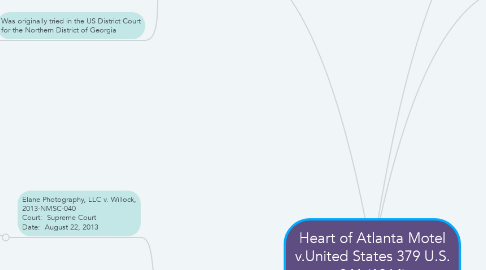
1. Facts
1.1. Parties
1.1.1. Plaintiff Heart of Atlanta Motel
1.1.2. Defendant United States
1.2. Heart of Atlanta Motel has 216 rooms available to transient guests.
1.2.1. Solicits patronnage from outside state of Georgia through national advertising media
1.2.2. 75% of guests are out of state
1.2.3. Prior to passage of the Civil Rights Act of 1964 it refused to rent rooms to Negroes.
1.3. Was originally tried in the US District Court for the Northern District of Georgia
1.3.1. A three-judge District Court upheld the constitutionality of Title II, §§ 201 (a), (b)(1) and (c)(1), the provisions attacked, and on appellees' counterclaim permanently enjoined appellant from refusing to accommodate Negro guests for racial reasons.
2. Impact
2.1. Elane Photography, LLC v. Willock, 2013-NMSC-040 Court: Supreme Court Date: August 22, 2013
2.1.1. Wedding photographer refused to photograph same sex commitment ceremony.
2.1.1.1. Originally determined that it violated New Mexico Human Rights Act which prohibits public accommodations from discriminating against people based on sexual orientation
2.1.1.2. Photographer argued that it was practicing within the New Mexico Religious Freedom Restoration Act (NMRFRA) which restricts free exercise of religion between a person and a government agency.
2.1.1.3. Court ruled that this did not violate NMRFRA as the government was not an involved party
2.1.1.3.1. Supreme court ruled that this does not raise Thirteenth amendment which was a determining factor in Heart of Atlanta case
2.2. Gonzales v. Raich, 545 U.S. 1 Court: Supreme Court Date: June 6, 2005
2.2.1. California residents that had medical conditions grew marijuana plants in order to treat themselves
2.2.1.1. County Officials deemed it to be lawful under California Law
2.2.1.2. Federal Agents destroyed and seized all the plants under the Controlled Substance Act (CSA).
2.2.1.3. The Court ruled that Congress was acting within its powers under the Commerce Clause article I section 8
2.2.1.3.1. Heart of Atlanta was cited with the following "We need not determine whether respondents' activities, taken in the aggregate, substantially affect interstate commerce in fact, but only whether a "rational basis" exists for so concluding."
3. Importance
3.1. A business professional will care about the decision in this case in their practices of equality between customers and to folllow federal laws when conducting interstate commerce
4. Influence
4.1. All consumer business practices are influenced by this case when it comes to discrimination against anyone based on race, gender or sexuality.
4.2. Any business that operates in interstate commerce will have to see how Congress has power under the Commerce Clause.
5. Issues
5.1. Is the Civil Rights Act of 1964 unconstitutional
5.2. Does the Commerce Clause give Congress the power to regulate local practices involving interstate commerce
6. Rule of Law
6.1. The Civil Rights Act of 1964
6.2. The Commerce Clause Article I section 8
6.3. The 13th Amendment
7. Analysis/Application
7.1. Plaintiff
7.1.1. The Plaintif argued that Congress in passing the Act exceeded its power to regulate commerce under ArtI Secion 8 clasue 3 of the Constitution.
7.1.2. The Act violates the Fifth Ammendment because ist deprived the right to choosie its customers to operate its business as it wishes.
7.1.3. That Congress is subject the business to involuntary servitude in contravention of the Thirteenth Amendment.
7.2. Defendant
7.2.1. The defendant argued that the refusal of accommodations to Negroes interferes significantly with interstate travel and that Congress under the Commerce Clause has power to remove such constraints.
7.2.2. Also the Fifth Amendment does not forbid regulation and does not take away its liberty and property without just compensation.
7.2.3. That the Thirteeth Amendment claim is frivolous and that the abolition of slavory is beyond reach of federal and state law.
7.3. Court
7.3.1. The court upheld the constitutionality of the Act under attack and issued a permanent injunction on the counterclaim of the defendant.
7.3.2. The court prevents the plaintiff from refusing to accept any guests by reason of their race or color.
7.3.3. The power of Congress is that it can prohibit racial discrimination by motels serving travelors , and that they can prevent activities that may have a substantial and harmful effect upon commerce.
7.3.4. In light of the Plaintiff stateing that it depreives liberty and property uner the Fifth Ammendment
7.3.4.1. Congress has rationas basis finding racial discrimination by motels affected commer
7.3.4.2. If such basis is formed eliminate evil that are reasonable and appropriate
7.3.5. That the Thirteenth Amendment and involuntary servitude was applicable to their case, the court found that 32 States prohibit racial discrimination in public accomidations
